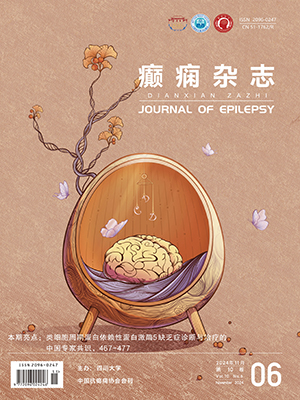| 1. |
Kwan P, Arzimanoglou A, Berg AT, et al. Definition of drug resistant epilepsy: Consensus proposal by the ad hoc Task Force of the ILAE Commission on Therapeutic Strategies. Epilepsia, 2010, 51(6): 1069-1077.
|
| 2. |
Cryan JF, O'Riordan KJ, Cowan CSM, et al. The Microbiota-Gut-Brain Axis. Physiol Rev., 2019, 99(4): 1877-2013.
|
| 3. |
Zhi He, Bo-Ta Cui, Ting Zhang, et al. Fecal microbiota transplantation cured epilepsy in a case with Crohn’s disease: The first report. World J Gastroenterol, 2017, 23(19): 3565-3568.
|
| 4. |
Olson CA, Vuong HE, Yano JM, et al. The Gut Microbiota Mediates the Anti-Seizure Effects of the Ketogenic Diet. Cell, 2018, 173(7): 1728-1741.
|
| 5. |
张季阶, 于丽娴. 一株无毒脆弱拟杆菌的分离鉴定. 宁夏医学杂志, 1991, 13(4): 216-218.
|
| 6. |
张季阶, 张洪梅, 张翼, 等. 脆弱拟杆菌(BF839)菌液的临床应用研究. 中国生物制品学杂志, 1995, 8(2): 63-65.
|
| 7. |
Scheffer IE, Berkovic S, Capovilla G, et al. ILAE classification of the epilepsies: Position paper of the ILAE Commission for Classification and Terminology. Epilepsia, 2017, 58(4): 512-521.
|
| 8. |
Gómez-Eguílaz M, Ramón-Trapero JL, Pérez-Martínez L, et al. The beneficial effect of probiotics as a supplementary treatment in drug-resistant epilepsy: a pilot study. Benef Microbes, 2018, 9(6): 875-881.
|
| 9. |
Lim KS, Lotay N White R, et al. Efficacy and safety of retigabine/ezogabine as adjunctive therapy in adult Asian patients with drug-resistant partial-onset seizures: a randomized, placebo controlled Phase III study. Epilepsy and Behavior, 2016, 61: 224-230.
|
| 10. |
Farkas V, Steinborn B, Flamini JR, et al. Efficacy and tolerability of adjunctive lacosamide in pediatric patients with focal seizures. Neurology, 2019, 93: e1212-e1226.
|
| 11. |
French JA, Baroldi P, Brittain ST, et al. Efficacy and safety of extended-release oxcarbazepine (Oxtellar XR™) as adjunctive therapy in patients with refractory partial-onset seizures: a randomized controlled trial. Acta Neurol Scand, 2014, 129(3): 143-153.
|
| 12. |
Jozwiak S, Terczynski A. Open study evaluating lamotrigine efficacy and safety in add-on treatment and consecutive monotherapy in patients with carbamazepine- or valproate-resistant epilepsy. Seizure, 2000, 9(7): 486-92.
|
| 13. |
Steinhoff BJ, Trinka E, Wieser HG, et al. Levetiracetam in patients with refractory epilepsy: results of the SKATE trial in Austria, Germany and Switzerand. Seizure, 2005, 14(7): 490-6.
|
| 14. |
Halász P, Kälviäinen R, Mazurkiewicz-Beldzinska M, et al. Adjunctive lacosamide for partial-onset seizures: Efficacy and safety results from a randomized controlled trial. Epilepsia, 2009, 50: 443-453.
|
| 15. |
Tassinari CA, Michelucci R, Chauvel P, et al. Double-blind, placebo-controlled trial of topiramate (600 mg daily) for the treatment of refractory partial epilepsy. Epilepsia, 1996, 37(8): 763-8.
|
| 16. |
Chung SS, Fakhoury TA, Hogan RE, et al. Once-daily USL255 as adjunctive treatment of partial-onset seizures: randomized phase III study. Epilepsia, 2014, 55(7): 1077-1087.
|
| 17. |
Chen Z, Brodie MJ, Liew D, et al. Treatment outcomes in patients with newly diagnosed epilepsy treated with established and new antiepileptic drugs: A 30-year longitudinal cohort study. JAMA Neurol, 2018, 75: 279-286.
|
| 18. |
Lee SK, Lee SA, Kim DW, et al. A randomized, open-label, multicenter comparative trial of levetiracetam and topiramate as adjunctive treatment for patients with focal epilepsy in Korea. Epilepsy Behav, 2019, Aug, 97: 67-74.
|
| 19. |
Mazmanian SK, Liu CH, Tzianabos AO, et al. An immunomodulatory molecule of symbiotic bacteria directs maturation of the host immune system. Cell, 2005, 122(1): 107-118.
|
| 20. |
Bowman LM, Holt PG. Selective Enhancement of Systemic Th1 Immunity in Immunologically Immature Rats with an Orally, Administered Bacterial Extract. Infection & Immunity, 2001, 69(6): 3719-27.
|
| 21. |
Round JL, Mazmanian SK. Inducible Foxp3+ regulatory T-cell development by a commensal bacterium of the intestinal microbiota. Proc Natl Acad Sci U S A, 2010, 107(27): 12204-12209.
|
| 22. |
Erturk-Hasdemir D, Kasper DL. Finding a needle in a haystack: Bacteroides fragilis polysaccharide A as the archetypical symbiosis factor. Ann N Y Acad Sci, 2018, 1417(1): 116-129.
|
| 23. |
Brodie MJ, Zuberi SM, Scheffer IE, et al. The 2017 ILAE classification of seizure types and the epilepsies: what do people with epilepsy and their caregivers need to know? Epileptic Disord, 2018, 20(2): 77-87.
|
| 24. |
Steriade C, Britton J, Dale RC, et al. Acute symptomatic seizures secondary to autoimmune encephalitis and autoimmune-associated epilepsy: Conceptual definitions. Epilepsia., 2020, 61(7): 1341-1351.
|
| 25. |
Britton J. Autoimmune epilepsy. Handb Clin Neurol, 2016, 133: 219-45.
|
| 26. |
Husari KS, Dubey D. Autoimmune Epilepsy. Neurotherapeutics, 2019, 16(3): 685-702.
|
| 27. |
Ong MS, Kohane IS, Cai T, et al. Population-Level Evidence for an Autoimmune Etiology of Epilepsy. JAMA Neurol, 2014, 71(5): 569-574.
|
| 28. |
Ravizza T, Gagliardi B, NoéF, et al. Innate and adaptive immunity during epileptogenesis and spontaneous seizures: evidence from experimental models and human temporal lobe epilepsy. Neurobiol Dis, 2008, 29(1): 142-160.
|
| 29. |
Aronica E, Crino PB. Inflammation in epilepsy: clinical observations. Epilepsia, 2011, 52(3): 26-32.
|
| 30. |
Crespel A, Coubes P, Rousset MC, et al. Inflammatory reactions in human medial temporal lobe epilepsy with hippocampal sclerosis. Brain Res, 2002, 952(2): 159-169.
|




